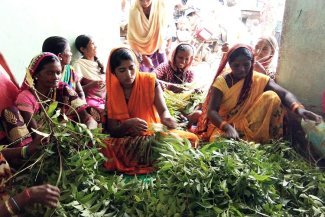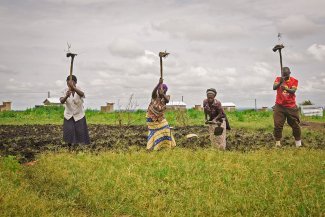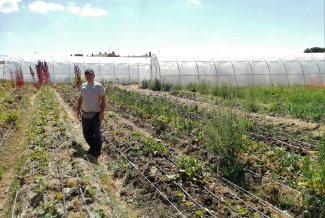In this image from 2015, students from Portugal and Indonesia prepare a meal with farm produce from Earth University – a global reference in agroecology education – based in India.
In 1909, German chemists Fritz Haber and Carl Bosch developed a process that made it possible, for the first time, to produce ammonia on a large scale from atmospheric nitrogen. This invention solved a major agricultural problem: the lack of nitrogen, a primary plant nutrient required for the production of proteins and chlorophyll and crucial to photosynthesis. It brought down one of the great limitations on crop yields, spurring an intensification and industrialisation of agriculture never before seen.
But as the development of industrial agriculture expanded and the damage it was doing to people and the environment became clearer, a choir of dissenting voices emerged, calling for food models with a lower environmental and social impact. The solutions they proposed were different, but one thing they agreed on from the outset was the importance of training in changing the model.
And so it was that Austrian Rudolf Steiner laid the foundations of biodynamic agriculture, the first organic farming movement, with his ‘Agricultural Course’, which was first presented in 1924 and was later turned into a book. Shortly afterwards, on the other side of the planet, Masanobu Fukuoka developed his own approach, under which, in addition to not using pesticides, he advocated minimal intervention, and also established a farm school in Japan to teach it.
Since then, training on the various types of pesticide-free agriculture has been a constant, and it continues to thrive in hundreds of educational centres around the world, some formal, some informal. “Today, at a time of multiple crises intensified by globalisation, we need to move away from the paradigm of nature as dead matter. We need to move to an ecological paradigm and, for this, the best teacher is nature herself,” said the renowned activist Vandana Shiva at her presentation of Earth University, a teaching centre, now a reference in agroecology education, that she opened in 2001, in India, for students from all over the world.
The centre, which has inspired similar schools, is now replicating the model in Europe, “where there are also problems with the industrial model of agriculture”, explains Navdanya International, an organisation founded by Shiva, and training is already underway in Italy.
Earth University is not the only such initiative in Asia. One of the oldest centres is the Asian Rural Institute (ARI), founded on Christian values, which has been operating in Japan since 1973. In south-east Asia, ALiSEA (Agroecology Learning alliance in South East Asia) offers training to farmers in the region with funding from the French government and the European Union.
The Asian Farmers’ Association for Sustainable Rural Development (AFA), established in 2002, provides farmers with capacity building to help them adopt more sustainable practices in the 16 Asian countries in which it works. There are also personal initiatives promoted by committed farmers, such as the Pun Pun Center for Self-Reliance in Thailand, which has trained more than 100,000 farmers since 2004 thanks to the efforts of its founder, Jon Jandai. Then there are the initiatives promoted by regional governments, such as the League of Organic Agriculture Municipalities, Cities and Provinces of the Philippines. (LOAMCP-Philippines).
Supporting traditional knowledge in Latin America and Africa
In Latin America, Miguel Altieri, professor emeritus in agroecology at the University of California, Berkeley, says education and training are key to reversing the “de-peasantisation” of agriculture. “In Latin America, there are an estimated 20 million farming families, of which a quarter still conserve traditional systems, primarily in the Andes, Mesoamerica and in some parts of the low humid tropics. The rest converted to the ‘Green Revolution’ [intensive agriculture with genetically modified organisms], but are starting to turn back,” Altieri explains. “A lot of work has been done to rescue traditional knowledge, which is now systematised.”
Major contributors to these efforts in the region include the Agroecology Institutes of Latin America (IALA), or similar initiatives set up by La Via Campesina (LVC), and the Latin American Coordination of Rural Organisations (CLOC). “In the Agroecology Institutes of Latin America, young people study with a commitment to return to the land. But not only do they receive technical training, they also receive political training, to help them understand why their parents had to leave the land, why their parents are poor and what they can do to help reverse this situation,” explains Altieri.
For the agroecologist, this is the fundamental difference with other non-conventional models because “agroecology is not just a set of agricultural practices”, it has more far-reaching implications, such as access to land and consumption, farmers’ autonomy or fair markets. “It’s a complete social and political transformation,” he explains.
In Africa, Ibrahima Seck, coordinator of FENAB (National Federation for Organic Agriculture) in Senegal, an umbrella organisation for initiatives promoting agroecology and organic farming in the country, points to European colonisation as one of the main reasons behind the intensification of agriculture.
“With colonisation, there were cash crops, such as cotton or cocoa, which were produced in line with the needs of the ruling country. And since independence, our governments have reproduced this model,” he says.
The result is the loss of traditional knowledge.
“For us, the fundamental basis of organic farming is the endogenous knowledge of our parents. And now it has to be taught again,” Seck continues. FENAB’s replicator model focuses on the teacher trainer, a person who has been trained to teach other teachers in organic farming. “We have trained more than 42 teacher trainers, who in turn have each trained 50 multipliers, that is, lead farmers who are able to replicate the training back home,” explains Seck. The FENAB initiative is part of a larger programme of the Knowledge Centre for Organic Agriculture in Africa (KCOA), which has been implemented in 12 countries on the African continent. Similarly, the Ecological Organic Agriculture Initiative (EOA-I), supported by the African Union and the Swiss Agency for Development and Cooperation, has trained 10,000 farmers in eight countries.
There is no exact data on how many farmers are being trained each year worldwide but, as an indication, the number of certified organic farmers recorded by the International Federation of Organic Agriculture Movements (IFOAM - Organics International) is on the rise. And while many non-conventional farmers never obtain certification, the number that did went from 200,000 in 1999 to 3.7 million in 2021, mostly in countries of the Global South such as India, Uganda and Ethiopia.
A model based on cooperation
Sonja Brodt, coordinator for Agriculture and Environment at the University of California’s Sustainable Agriculture Research and Education Program, is very clear that one of the keys to building a more sustainable food system is cooperation, which not only strengthens the work of farmers but also drives innovation to find new solutions.
“One thing that drives innovation is to have different people bringing different perspectives to the table,” she says. Brodt leads a farm demonstration project in California that not only shows how to improve soil health and climate resilience but also seeks to promote innovation among farmers and other actors. Scientists, like Brodt, have their own role to play in these “innovation networks”. “Observation is key in science and it is something farmers already do,” she explains. “Science is about systematising those observations and taking them to other contexts. We are also able to make some deeper observations thanks to the tools we have,” explains Brodt.
For Loren Cardeli, one of the founders of international NGO A Growing Culture (AGC), this change of model will not arise unless the narratives are changed and industrial agriculture is no longer seen as the only system capable of feeding a growing population.
“We have all the evidence that agroecology is better for communities and more efficient,” says Cardeli.
“Of all the monopolies in industrial agriculture, the most powerful is the monopoly of fear,” he adds. To achieve a change of narrative, AGC offers farmers support to connect with the resources and training they need to be able to tell their own stories. “There are hardly any organisations dedicated to the narratives and communication about this cultural change,” says Cardeli. “And this is absolutely crucial to adopting a model of agriculture that puts people before profits,” he concludes.













